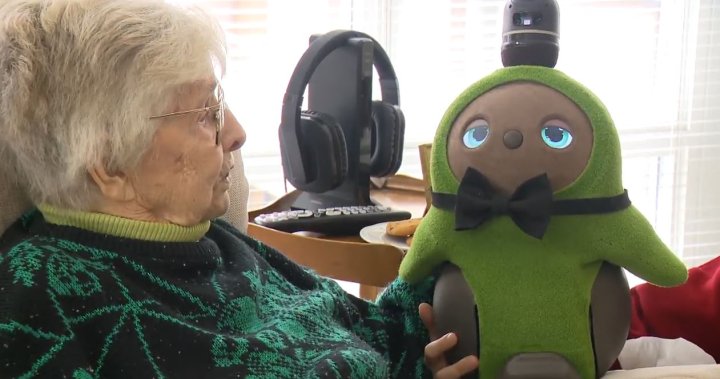
Can social robots help add joy and meaning to the lives of seniors and people with dementia as they age?
It’s a question researchers with the University of British Columbia are asking, as they introduce a pair of “Lovots” (love robots) to people living in long-term care.
Kiwi and Mango are small and plush — described as a cross between Teletubbies and WALL-E — and packed with technology that allows them to move around, learn, speak and recognize faces and voices.
“The robot was designed to bring joy to older people so what the robot does, is it will come to you with its AI-enabled machine learning,” explained research lead Dr. Lillian Hung, Canada research chair in senior care at UBC’s School of Nursing.

“Each time it comes it will learn a little bit about you and adapt to human beings. It wants to come to you and seek some love from you, kind of like domestic cats.”
The idea comes from Japan, Hung explained, and is meant to help add a sense of purpose by giving elders something to care for and interact with.
Researchers want to see how North Americans, who may not have the same cultural feelings about robots, experience and perceive the technology, while assessing their potential to address loneliness and boredom.
The Canadian study, primarily conducted through a partnership with Amica Senior Lifestyles, is being conducted in collaboration with researchers in Singapore and Hong Kong.
They appeared to be a big hit at Amica West Vancouver on Tuesday, as researchers introduced them to residents like centenarian Charlotte.
“Look at his little arms go up and down,” she exclaimed as Kiwi cooed and chirped at her.
“I’ve just got the dearest friend on my lap.”
Mario Gregorio, a patient partner in the program who lives with dementia and acts as a mentor for students at UBC’s Idea Lab, said the robots could play an important role in improving lives.

“It’s a connection — I like to think of it as something like a cat, a dog and a two-year-old baby combined together, so it feels like it needs the attention — and at the same time it gives the feeling to the resident of being connected to something,” he said.
“We are so lucky that two of them were loaned to us for a limited time for research purposes.”
The initiative isn’t the first time Hung has worked with robots.
She’s conducted previous research with Paro, a robotic seal, which suggested companion robots could be beneficial for people with dementia.
Researchers are hoping to understand what further benefits an AI-enabled robot, which can learn from humans, could have.
“Its not just about what the robot does and how does the robot give love, it’s about how do we give love to each other,” she said.
“It really shows us the human quality that we share among each other, that we have that essential, fundamental need of having social connections.”

Amica West Vancouver general manager Chris Huggins said he wasn’t surprised at residents’ positive reaction to the robots.
Social interaction is a natural part of healthy aging, he said, and new tools that can help achieve that goal are “extremely exciting,” he said.
“Their personality improves and the residents become more comfortable with them as they spend more time with them, so I think to have four or five roaming around would be a lot of fun,” he said.
“With technology we need to embrace it.”
Hung said researchers will be observing and recording residents’ interactions with Kiwi and Mango, and interviewing care home staff and residents’ families to get a better idea of their impact.
With technology advancing and North America’s population rapidly aging, she said she hopes the research can begin to touch on major questions — including the implications of entrusting emotional and social support roles to machines.
© 2023 Global News, a division of Corus Entertainment Inc.
















